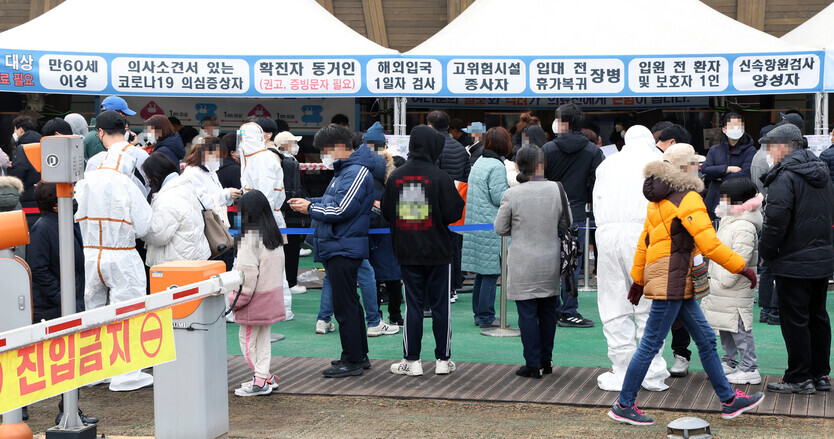hankyoreh
Links to other country sites 다른 나라 사이트 링크
Nearly half of S. Koreans don’t trust government’s COVID-19 response, survey finds

The South Korean public’s trust in the COVID-19 response by the government and disease control authorities has taken a severe hit, survey results show.
As the virus’s Omicron variant continues to spread, more and more people expressed the belief that they could also end up infected. One out of every two respondents predicted everyday disease control measures could remain in place for another year or two.
These were among the findings from a survey of public perceptions on COVID-19 published on Monday by a research team led by You Myoung-soon, a professor at the Seoul National University Graduate School of Public Health.
Since January 2020, You has been administering surveys on perceptions about the likelihood of infection and the predicted severity of the outcome in cases of infection.
The latest survey was administered to 1,000 adult men and women by the polling organization Survey People between Feb. 25 and March 2. It had a margin of error of plus or minus 3.1 percentage points with a 95% confidence level.
The findings showed that at 52.4%, slightly more than half of respondents answered that they trusted the government (both the Blue House and local governments) as agents in the country’s infectious disease response.
In the case of disease control authorities such as the Korea Disease Control and Prevention Agency and the Ministry of Health and Welfare, 63.3% of respondents expressed trust, down by around 23 percentage points from the 83% recorded in June 2020. Respondents showed high levels of trust in healthcare professionals (80.6%) and scientific experts (77.2%).
When asked to evaluate the COVID-19 response in South Korea to date, 42.5% rated it as “good.” Another 24% rated it as “poor,” while 33.3% said it was “neither good nor bad.” Of respondents, 58.4% said they trusted the recent Omicron response policies.
Six out of 10 respondents said they did not believe the risk of COVID-19 infection was socially controllable. A total of 63.4% of respondents agreed that it was “beyond control,” with particularly high percentages seen among respondents with infants and teenaged children.
The ratings of perceived COVID-19 risks were the strongest observed since the surveys were first administered in January 2020. Of respondents, 27.8% viewed themselves as “very likely” to be infected with COVID-19, up by 16.3 percentage points from the 11.5% recorded in November 2021.
But at 47.9%, the percentage of respondents predicting that the outcome of an infection would be severe was the lowest for any survey yet — an apparent reflection of the characteristics of the Omicron variant, which is more transmissible than the previous Delta variant but associated with less severe symptoms.
When asked how much longer they expected disease control measures to remain in place in day-to-day life, 52.6% of respondents predicted “one to two years.” Another 28.2% said “less than a year,” while 19.2% said “two or more years.”
The percentage of respondents predicting the everyday disease control measures would remain for less than a year was up by 17.2 percentage points from 11% in a previous survey.
When respondents were asked what values they saw as being “severely challenged” as the COVID-19 pandemic wears on, the most frequent response was “social safety” (47.5%), followed by “health and well-being” (46%) and “trust in the government” (43.6%).
In comparison with previous findings from surveys in August 2020 and February 2021, the latest results showed stronger perceptions that values such as “trust in the government” and “social vitality” were under threat.
By Jang Hyeon-eun, staff reporter
Please direct questions or comments to [english@hani.co.kr]

Editorial・opinion
![[Column] Samsung’s ‘lost decade’ and Lee Jae-yong’s mismatched chopsticks [Column] Samsung’s ‘lost decade’ and Lee Jae-yong’s mismatched chopsticks](https://flexible.img.hani.co.kr/flexible/normal/500/300/imgdb/original/2024/0512/3017154788490114.jpg) [Column] Samsung’s ‘lost decade’ and Lee Jae-yong’s mismatched chopsticks
[Column] Samsung’s ‘lost decade’ and Lee Jae-yong’s mismatched chopsticks![[Correspondent’s column] The real reason the US is worried about Chinese ‘overcapacity’ [Correspondent’s column] The real reason the US is worried about Chinese ‘overcapacity’](https://flexible.img.hani.co.kr/flexible/normal/500/300/imgdb/original/2024/0510/5217153290112576.jpg) [Correspondent’s column] The real reason the US is worried about Chinese ‘overcapacity’
[Correspondent’s column] The real reason the US is worried about Chinese ‘overcapacity’- [Editorial] Yoon’s gesture at communication only highlights his reluctance to change
- [Editorial] Perilous stakes of Trump’s rhetoric around US troop pullout from Korea
- [Guest essay] Preventing Korean Peninsula from becoming front line of new cold war
- [Column] The state is back — but is it in business?
- [Column] Life on our Trisolaris
- [Editorial] Penalties for airing allegations against Korea’s first lady endanger free press
- [Editorial] Yoon must halt procurement of SM-3 interceptor missiles
- [Guest essay] Maybe Korea’s rapid population decline is an opportunity, not a crisis
Most viewed articles
- 1Seoul’s plan to adopt SM-3 missiles is like wanting a sledgehammer to catch a fly
- 2[Column] Samsung’s ‘lost decade’ and Lee Jae-yong’s mismatched chopsticks
- 3[Correspondent’s column] The real reason the US is worried about Chinese ‘overcapacity’
- 4Korea poised to overtake Taiwan as world’s No. 2 chip producer by 2032
- 560% of young Koreans see no need to have kids after marriage
- 6[Editorial] Yoon’s gesture at communication only highlights his reluctance to change
- 7Yoon voices ‘trust’ in Japanese counterpart, says alliance with US won’t change
- 8Yoon rejects calls for special counsel probes into Marine’s death, first lady in long-awaited presse
- 9S.K.-Japan joint history project to be revived
- 10Former President Roh Tae-woo, mastermind of 1979 military coup, dies at 88